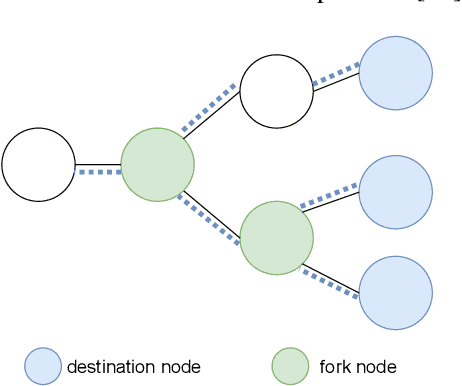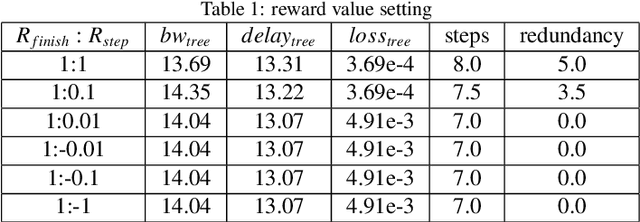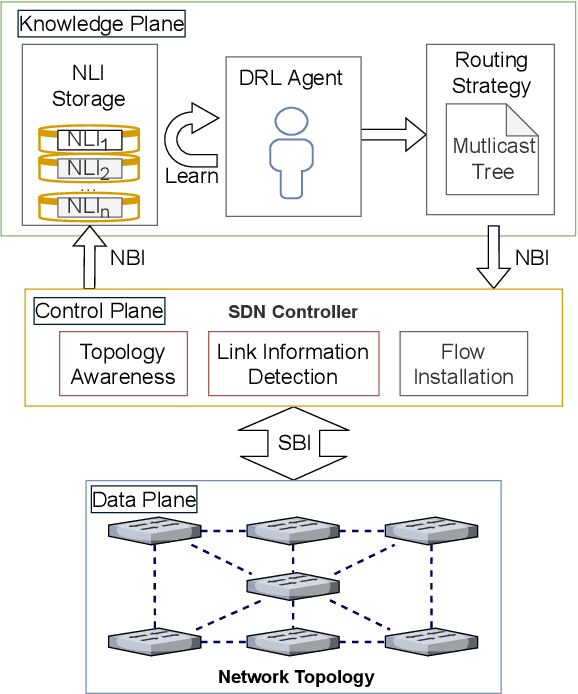Chenwei Zhao
DHRL-FNMR: An Intelligent Multicast Routing Approach Based on Deep Hierarchical Reinforcement Learning in SDN
May 30, 2023Abstract:The optimal multicast tree problem in the Software-Defined Networking (SDN) multicast routing is an NP-hard combinatorial optimization problem. Although existing SDN intelligent solution methods, which are based on deep reinforcement learning, can dynamically adapt to complex network link state changes, these methods are plagued by problems such as redundant branches, large action space, and slow agent convergence. In this paper, an SDN intelligent multicast routing algorithm based on deep hierarchical reinforcement learning is proposed to circumvent the aforementioned problems. First, the multicast tree construction problem is decomposed into two sub-problems: the fork node selection problem and the construction of the optimal path from the fork node to the destination node. Second, based on the information characteristics of SDN global network perception, the multicast tree state matrix, link bandwidth matrix, link delay matrix, link packet loss rate matrix, and sub-goal matrix are designed as the state space of intrinsic and meta controllers. Then, in order to mitigate the excessive action space, our approach constructs different action spaces at the upper and lower levels. The meta-controller generates an action space using network nodes to select the fork node, and the intrinsic controller uses the adjacent edges of the current node as its action space, thus implementing four different action selection strategies in the construction of the multicast tree. To facilitate the intelligent agent in constructing the optimal multicast tree with greater speed, we developed alternative reward strategies that distinguish between single-step node actions and multi-step actions towards multiple destination nodes.
Intelligent multicast routing method based on multi-agent deep reinforcement learning in SDWN
May 12, 2023



Abstract:Multicast communication technology is widely applied in wireless environments with a high device density. Traditional wireless network architectures have difficulty flexibly obtaining and maintaining global network state information and cannot quickly respond to network state changes, thus affecting the throughput, delay, and other QoS requirements of existing multicasting solutions. Therefore, this paper proposes a new multicast routing method based on multiagent deep reinforcement learning (MADRL-MR) in a software-defined wireless networking (SDWN) environment. First, SDWN technology is adopted to flexibly configure the network and obtain network state information in the form of traffic matrices representing global network links information, such as link bandwidth, delay, and packet loss rate. Second, the multicast routing problem is divided into multiple subproblems, which are solved through multiagent cooperation. To enable each agent to accurately understand the current network state and the status of multicast tree construction, the state space of each agent is designed based on the traffic and multicast tree status matrices, and the set of AP nodes in the network is used as the action space. A novel single-hop action strategy is designed, along with a reward function based on the four states that may occur during tree construction: progress, invalid, loop, and termination. Finally, a decentralized training approach is combined with transfer learning to enable each agent to quickly adapt to dynamic network changes and accelerate convergence. Simulation experiments show that MADRL-MR outperforms existing algorithms in terms of throughput, delay, packet loss rate, etc., and can establish more intelligent multicast routes.
DRL-M4MR: An Intelligent Multicast Routing Approach Based on DQN Deep Reinforcement Learning in SDN
Jul 31, 2022



Abstract:Traditional multicast routing methods have some problems in constructing a multicast tree, such as limited access to network state information, poor adaptability to dynamic and complex changes in the network, and inflexible data forwarding. To address these defects, the optimal multicast routing problem in software-defined networking (SDN) is tailored as a multi-objective optimization problem, and an intelligent multicast routing algorithm DRL-M4MR based on the deep Q network (DQN) deep reinforcement learning (DRL) method is designed to construct a multicast tree in SDN. First, the multicast tree state matrix, link bandwidth matrix, link delay matrix, and link packet loss rate matrix are designed as the state space of the DRL agent by combining the global view and control of the SDN. Second, the action space of the agent is all the links in the network, and the action selection strategy is designed to add the links to the current multicast tree under four cases. Third, single-step and final reward function forms are designed to guide the intelligence to make decisions to construct the optimal multicast tree. The experimental results show that, compared with existing algorithms, the multicast tree construct by DRL-M4MR can obtain better bandwidth, delay, and packet loss rate performance after training, and it can make more intelligent multicast routing decisions in a dynamic network environment.
 Add to Chrome
Add to Chrome Add to Firefox
Add to Firefox Add to Edge
Add to Edge